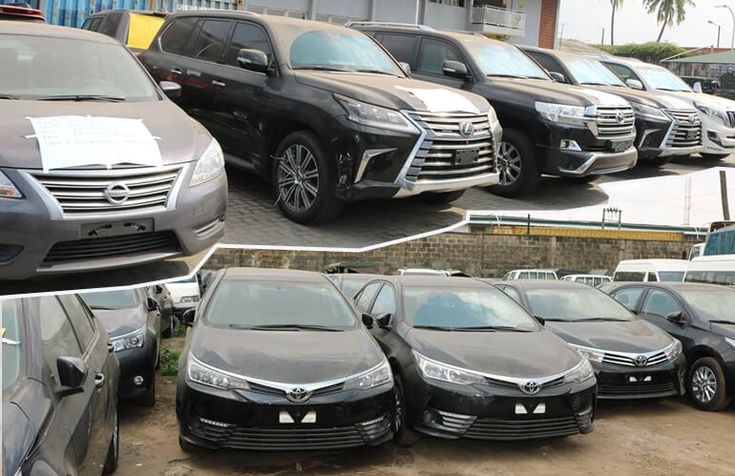In 2001, Nigeria was at a crossroads.
The telecoms industry had just opened up, and millions of Nigerians were getting their first taste of GSM. Behind the scenes, Vice President Atiku Abubakar, as Chair of the National Economic Council and National Council on Privatization, was quietly helping to dismantle the inefficiencies of the past — bringing in foreign investment, modernizing customs operations, and introducing reforms that made it easier for businesses and individuals to trade, clear goods, and grow.
Customs clearing processes were becoming more digitized. Valuations were tied to documented invoices. Life was still hard, but at least it was predictable. If you bought a car abroad and had your invoice, you knew how much to pay. That’s the rule of law in trade — and Atiku understood that.
Fast forward to 2025 under Tinubu’s APC government — and all that progress is unraveling.
The Real Reason Cars Are Now Luxury Items

Let’s be clear: Cars in Nigeria are not becoming more expensive because of a 4% Free on Board (FOB) charge. That’s a distraction.
The real issue is that the valuation of imported cars and goods is no longer based on your official invoice or market value. Instead, Customs officers now arbitrarily assign inflated values to vehicles and goods — completely ignoring the global market or actual purchase price.
What does this mean?
It means:
- You buy a 2015 Toyota Corolla abroad for $3,000 and have the invoice to prove it.
- But Customs decides the car is worth $8,000.
- You now pay duty, VAT, levy, and other charges on $8,000 instead of $3,000.
- You’re robbed — legally.
In some ports, clearing a modest used car now costs over ₦5–₦7 million, effectively pricing young Nigerians out of mobility and economic freedom.
The Impact on Gen Z: Dreams on Hold, Hustles Cut Short
This isn’t just about cars — it’s about access to opportunity.
Gen Z thrives on independence, movement, and hustle. From Bolt drivers and dispatch riders to e-commerce vendors, photographers, and freelancers — many Gen Z careers rely on mobility. A car isn’t a luxury anymore; it’s a tool.
Under this arbitrary Customs regime, Gen Z:
- Can’t afford to import fairly priced vehicles
- Can’t scale delivery businesses
- Can’t earn from mobility-based side hustles
- Can’t enjoy the dignity of personal transportation
And in a country with almost zero functioning public transport, what options are left?
This Isn’t the First Time We’ve Been Here: 5 Political Lessons We Must Not Forget
To understand how we got here, we need to revisit Nigeria’s past:
1. 1984 – Buhari’s Infamous Import Ban Regime
General Buhari’s military government imposed draconian import bans and complex licensing systems. The result? Black markets boomed, corruption soared, and ordinary Nigerians suffered. Today’s customs valuation policy feels like a repeat of that disaster — arbitrary, unchecked, and anti-people.
2. 1999–2007 – Atiku’s Trade Liberalization Reforms
Atiku helped roll back many of these oppressive trade practices. Under Obasanjo’s government, they cut tariffs, improved port processes, and gave Nigeria its first serious customs modernization plan. It was a pivot toward predictability and private sector growth.
3. 2015 – Buhari’s Return and Import Policy Chaos
The APC resumed anti-import policies under the guise of “self-sufficiency.” 41 items were banned from forex access. Car prices began rising. Customs valuation quietly became more opaque.
4. 2019 – Border Closure Disaster
Buhari’s closure of Nigeria’s land borders crushed regional trade and spiked food prices. Gen Z importers and SME owners lost billions. Tinubu has continued this legacy of economic isolation instead of creating smarter, tech-enabled customs processes.
5. 2023–2025 – Tinubu’s Forex Devaluation & Tax Confusion
With the naira floating above ₦1,500/$1 and importers left at the mercy of fluctuating exchange rates, Tinubu’s government added insult to injury with multiple layers of taxation — including the 4% FOB charge — while Customs officials abuse discretion unchecked.
What Atiku Will Do Differently
Atiku Abubakar has made it clear: a functional economy must be rules-based, not power-based.
As President, he will:
- Restore invoice-based customs valuation to ensure fairness and reduce corruption.
- Digitize all customs processes, reducing human interference and exploitation.
- Simplify and unify port charges to make importing and doing business affordable again.
- Support affordable vehicle ownership schemes for youth, tech workers, and freelancers.
- Create an enabling environment where mobility is a right, not a privilege.
This is not just about cars. It’s about whether young Nigerians can live free, mobile, connected lives in a country that respects their effort and enterprise.
Conclusion: We Deserve a Government That Doesn’t Scam Its Own People
Today’s customs valuation chaos is not just bad policy — it is economic oppression. It is an insult to every Gen Z Nigerian who is hustling honestly and hoping for a fair shot.
Atiku Abubakar offers an alternative rooted in reform, fairness, and functionality. He’s not perfect, but his record is clear — when he had the chance to lead on trade, he made things easier, not harder.
In 2027, we don’t just want a president.
We want a country that works.
We want a system that respects our effort, our invoices, our hustle.
And we believe Atiku is the one to make that happen.
